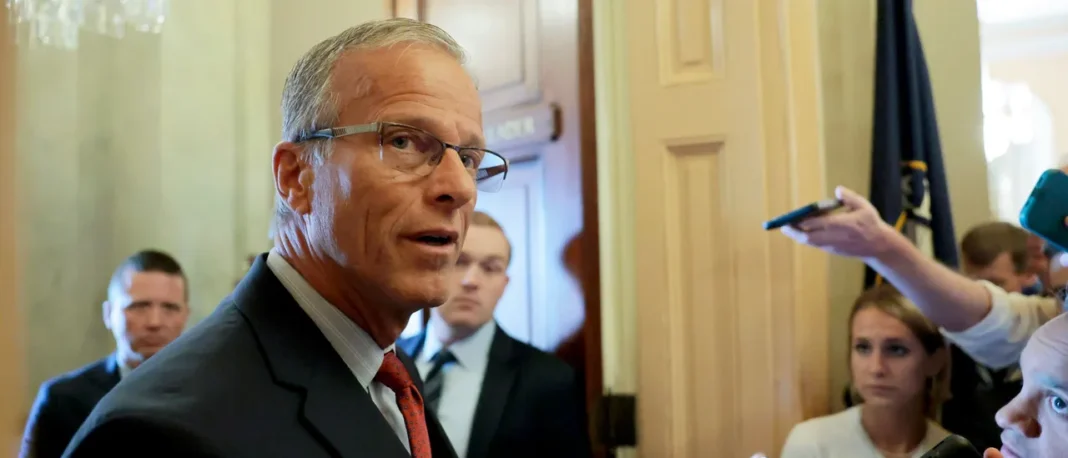Senate Republicans and conservative activists are divided over whether GOP leadership is doing enough to fully utilize all available options to confirm President Donald Trump’s nominees.
Senate Majority Leader John Thune currently has two strategic paths he can pursue to more quickly advance the confirmation of Trump’s nominees, according to sources familiar with Senate procedure.
While Thune has blamed Democrats for the nominee backlog, critics say he could stack cloture votes to reduce the amount of time it takes nominees to advance, and force the Senate to work longer hours until Trump’s nominees are through. Alternatively, he could move to adjourn and allow the president to make recess appointments.
There are pluses and minuses to both of these options, a source familiar with Senate procedure explained.
But for now, they’re choosing to do neither, instead pursuing a “deal” with Senate Democrats.
Leadership says it needs to preserve time for legislative business — but critics question what legislation is actually moving and whether it outweighs the urgency of confirming Trump’s nominees. The main legislation in question was funding for military construction and Veterans’ Affairs, but that passed Friday night along with other spending initiatives.
Since the Senate cannot conduct legislative and executive business at the same time, bringing up a flood of nominations would force them to suspend legislative action entirely. Senate leadership is concerned, sources explained, that stacking cloture votes would stall critical legislative work, and could politically backfire if the Senate appears gridlocked and still attempts to recess.
A source familiar told the Daily Caller that the White House is in talks with Senate Minority Leader Chuck Schumer regarding the confirmation nominations, suggesting a deal could be made to get Democrat to agree to a faster process.
Republicans have mostly blamed the delay on Democrats using obstructionist tactics, such as declining to advance nominees through unanimous consent rules.
But conservatives are suggesting the Senate can operate more aggressively, which would put pressure on the Democrats to behave more favorably to the GOP and the president.
Thune can theoretically stack all cloture motions on nominations at once consistent with Senate Rule XXII, which states “at least 16 Senators sign a cloture motion to end debate on a pending nomination.” This would speed up the process to about a total of two and a half hours per nominee. Getting through all 144 of Trump’s nominees waiting for floor time in the Senate would effectively shut down all other Senate business for a week and require non-stop work. (RELATED: EXCLUSIVE: John Thune Shares His ‘Big, Beautiful’ GOP Sales Pitch For The Midterms)
A Senate Republican aide familiar with the nominations process claimed Thune’s attempts to place all of the blame on Democrats and prioritize legislative action over confirming nominees doesn’t pass muster.
“My policy team is a bit confused about what Thune’s people are trying to pretend here,” the aide said. (RELATED: JENNY BETH MARTIN: Leader Thune Should Cancel August Recess)
“It’s regular Senate business that happens all the time,” the aide continued. “Getting the signatures is easy, stacking the nominations is easy. It’s like saying, ‘we can’t go to McDonald’s because we’d have to drive there in the car’ — not really an argument.”
A source familiar with Senate procedure similarly said it doesn’t make sense for Thune to prioritize legislative action on the military bill over confirming nominees. The military bill, the source alleged, wouldn’t pass the House anyway because the Senate “stripped out pro-life protections.”
During an appearance on “War Room” with host Steve Bannon on Thursday, Republican Utah Sen. Mike Lee appeared to endorse a brute force method of getting the nominees through.
“The consequence has got to be, fine if you want to delay you’re going to have to take a lot of votes at inconvenient times when you would much rather be somewhere else,” Lee explained. “Steve, there is nothing in the United States Senate that moves mountains quite like the desire to get out of town and quite like the principle of exhaustion.”
No confirmations without consent
No consent without inconvenience
No inconvenience without forcing votes
This is the way—the only way
If we don’t make them vote—now, instead of letting everyone take August off—this is on us https://t.co/agugNBSK7k
— Mike Lee (@BasedMikeLee) July 30, 2025
Forcing Senate Democrats to spend valuable floor time on confirmations would indeed create a legislative logjam and potentially escalate into a high-stakes stalemate. The GOP would be betting on how long Senate Democrats might be willing to hold out and block all other business — potentially for weeks or even months — in order to push through the backlog of nominations.
As Lee indicated, the idea is to make it as “inconvenient” as possible for Democrats to resist unanimous consent on Trump’s nominees.
Rachel Bovard, Vice President of Programs at the Conservative Partnership Institute, has spent over a decade on Capitol Hill in various capacities in the House and Senate. Bovard argued that Republicans can file cloture on all of the outstanding nominees at once and then consider legislative business during the two hours of post-cloture debate.
“They can be filing on nominees at the same time as they are in consideration on a legislative item,” Bovard said. “So they can be filing cloture, and that cloture process can be ripening on the executive calendar while they’re still doing [the military funding] bill.”
Democrats, she explained on X, would be incentivized to unanimously consent to consider other business during the post-cloture period if the GOP flooded the calendar with nominees.
The goal of every negotiation in the Senate is a consent agreement. You aren’t going to get one from Dems until you start physically exhausting them with votes. File on 80 noms and say we’re not leaving until we’re done. 25 votes in, Dems will start negotiating. https://t.co/2JccIoF5MP
— Rachel Bovard (@rachelbovard) July 30, 2025
Another option available to the Senate GOP is to leverage the threat of recess appointments by Trump.
During an appearance on “War Room,” Republican Missouri Sen. Josh Hawley called for House Speaker Mike Johnson and Thune getting together and telling Democrats they either limit debate and move nominees through quickly — or they get recess appointments.
“I think it’s time for Senate leadership to go talk to Mike Johnson over in the House and for them to get together and say, ‘You know what, it’s time to deliver an ultimatum to our Democrat friends,’” Hawley said.
“Which is, you either come to the table and play ball and start confirming these judges and these other nominees in a reasonable timeframe — like every other administration has done throughout history — or we’re going to recess the House and the Senate together, like the Constitution expressly permits, and the president is going to fill up the rest of his cabinet and his administration with recess appointments,” the senator explained.
SEN. JOSH HAWLEY (R): Democrats are filibustering every single one of Trump’s nominees.
Don’t cry foul when he says it’s time for recess appointments.
However, judges can’t be recess appointed. These are lifetime roles, and we MUST get them confirmed.@HawleyMO pic.twitter.com/LIE7UWob61
— Bannon’s WarRoom (@Bannons_WarRoom) July 29, 2025
A source familiar with Senate procedure said Hawley is “exactly right.”
“Democrats could agree via unanimous consent to fast track a select number of nominees to which there are no real objections — or Senate goes on recess and POTUS gets to appoint whoever he wants,” the source said. “That threat creates leverage.”
Trump has the option to make recess appointments under the Constitution’s Recess Appointments Clause, which states the President “shall have Power to fill up all Vacancies that may happen during the Recess of the Senate, by granting Commissions which shall expire at the End of their next Session.”
If both the House and Senate agree to adjourn, or if they can’t agree on when to adjourn, the president has the constitutional authority to step in and set a time for adjournment.
Once Congress is officially in recess, the president can then make recess appointments to fill vacant positions without Senate confirmation.
Another Senate aide pointed out that the House didn’t pass a resolution to allow recess appointments before leaving town — noting they’d have to return from August recess to do so.
Eric Teetsel, the CEO of Center for Renewing America, believes recess appointments are a more effective and efficient way to get through the massive backlog of nominees facing the Senate.
“The Senate could just work more but even then they would only make a dent in the total number of outstanding nominees,” Teetsel said. “Recess appointments are a better option — you can fill as many positions as the president wants to in one fell swoop.” (RELATED: John Thune Warns Dems They’ll Get The Blame If Schumer Forces Government Shutdown)
“There are some parameters to recess appointments, particularly that they can only serve for a certain period of time,” he continued. “But having someone there temporarily is better than having no political appointee at all, and a recess appointment doesn’t preclude them from being Senate confirmed later on.
While stacking cloture motions could put pressure on Democrats and help the Senate get through the 144 nominees waiting for floor time, it would not be a feasible way to get through all 1,300 or so executive nominees that are still outstanding. The Senate instead could advance the president’s judicial nominees through normal process or by stacking clotures, as they are barred from being confirmed without Senate approval, then move to adjourn and allow the president to appoint the rest of his non-judicial nominees.
One source provided two theories as to why Senate leadership isn’t fully on board with recess appointments. One is that some senators are “institutionalists” and don’t want to hand over their advise and consent power to the president. Two is that they may disapprove of some of Trump’s nominees and don’t want to give them tacit approval by moving to adjourn and allowing the president to appoint them.
Regardless of an arguably less aggressive process and Democratic obstruction, Senate Republicans note that they are still moving faster in approving Trump’s nominees when compared to the president’s first term. According to materials from the Senate Republican Communications Center shared with the Caller, as of July 24, 109 of President Trump’s civilian nominees have been confirmed by roll call vote. During Trump’s first term, only 55 civilian nominees had been confirmed at that point.




